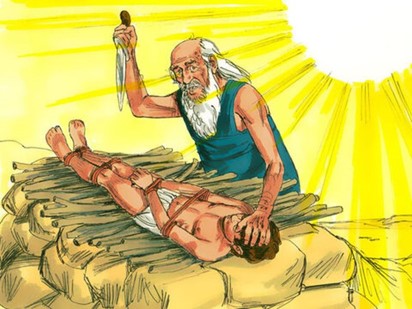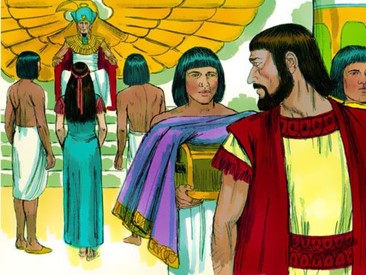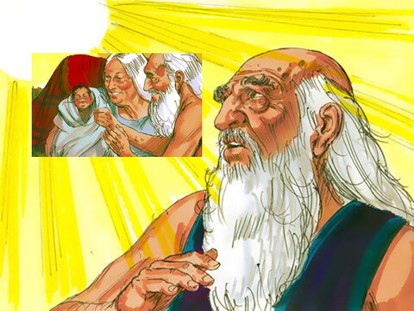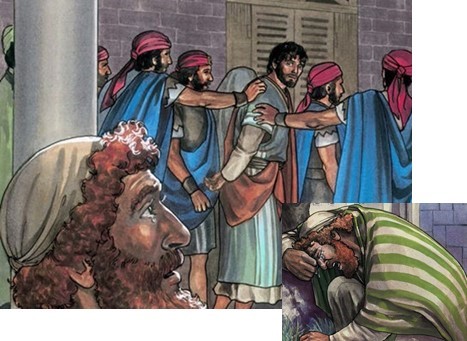Good morning!
Greetings in the name of Father, Son, and Holy Spirit.
Praying for you, your family, your community, and the rest of the world. Right now, the whole world is suffering because of the Coronavirus (COVID-19). Let’s pray together to God, Our Ever-Loving Father, His mercy and protection on all, and God’s healing on those who are infected by the Coronavirus. We all believe God’s grace and love rest on all who look upon Him every moment with faith in Him.
But you, O Lord, are a God of compassion and mercy, slow to get angry and filled with unfailing love and faithfulness. (Psalm 86:15)

Abraham passed the test, which was the hardest moment in his life. Indeed, it was also for God who dearly loves Abraham. The final test that Abraham had to pass to be the father of faith for all believers, but God, the Father, could not make him pass. If so, it defeated the entire purpose of the test. The test was to sacrifice Abraham’s one and only son, Isaac, to God.
Why did Abraham end up taking such an unthinkably difficult test? Abraham’s faith was not up to the level that God desired. Abraham’s faith was indeed extraordinary. He fought against his doubt for twenty-five years. He had no son, and his wife was barren. Even so, he believed God’s covenant that he would be the father of a great nation. Abraham trusted in God like a child, and he left everything, including his native country, relatives, and father’s family. Then he followed God. When he left, he did not know where he went.
Why did Abraham fight against doubts for twenty-five years? If everything went well, then Abraham had no reason to fight against doubts against God’s promise. Abraham indeed struggled to hold tight on his faith in God. Soon after his arrival to the promised land, a server famine came.
He went to Egypt while expecting relief from the server famine, but he met a threat of losing his life. To protect his life, he lied, which led to losing his wife. Pharaoh took her because Pharaoh believed Abraham’s lie that Sarah was his sister. As soon as Pharaoh realized Abraham’s lie, Pharaoh called in Abraham and completely humiliated Abraham. Pharaoh even could kill Abraham out of his anger, but God forbid. While Abraham was in Egypt, God continued protecting Abraham and his wife. Pharaoh sent Abraham and Sarah safely out of Egypt with all the gifts granted to Abraham when he took Sarah from Abraham.

Although Abraham was not faithful to God by leaving the promised land without enduring the famine in faith, God was unconditionally faithful to Abraham. Yes, it is easy to say while sitting on a comfortable chair. But how many people can endure such a severe famine in a foreign land where nobody is willing to help?
It was not all. Abraham’s most serious challenge was that he had no son who would be the see for the great nation that God promised, and his wife was barren. Getting a son from a barren wife was impossible. Even so, he believed in God’s promise and trusted God.
Abraham had much stronger faith than all of us. However, his faith alone could not make him believe God’s impossible promise. This is the reason why Abraham struggled while doubting. Didn’t God know this? Yes, God knew. God knew Abraham’s struggle, and Abraham’s faith would fail. Nobody has perfect faith in God because no human being can have perfect faith.
By the way, what is faith after all? Doesn’t it believe in what is impossible? If we believe only something possible, can we call it “faith”? No. It is mere knowledge. Knowledge is lifeless like a rock, which has no power to overcome impossibility, but faith is a living thing that directly goes against impossibility.
For with God nothing will be impossible. (Luke 1:37)
Abraham’s doubt had never left him completely throughout his life, which haunted him. Sarah saw Abraham’s struggle and brought the most attractive but worldly solution — getting a son out of her servant, Hagar. Without asking God, Abraham accepted the proposal, and Hagar bore Ishmael. Initially, Ishmael made both Abraham and Sarah extremely happy. They believed they finally touched God’s promise.
But Ishmael soon became the source of problems in Abraham’s household. Ishmael came in between Abraham and Sarah. There was a tense rivalry between Sarah and Hagar. God let Abraham live in between Sarah and Ishmael. Abraham was slowly and steadily losing Sarah, but he did not know. He just enjoyed Ishmael growing strong. Sarah’s heart was breaking more and more day after day. It was not the household used to be. The situation was getting worse till Ishmael became a teenager.

God saw Sarah’s heart pain and opened her womb. God’s angel said she would have a son by the same time next year. Sarah laughed. She wanted to believe what she heard, but she knew it was impossible. So far, Sarah did everything to have a baby for 24 years, but nothing had happened. She was already 89 years old. Could Sarah believe the angel’s message? No. However, God was faithful. She bore a son and named Isaac, which meant “laughter.” Finally, God provided her with laughter, and no more sadness was with her!
Yes, Abraham and Sarah not so faithful as God, but God gave them the promised son, Isaac. Then God commanded to send away Ishmael, who was not the true heir. Abraham was initially reluctant, but he followed God’s command. It was not an easy decision. Then true peace came to Abraham and Sarah. Isaac grew in stature and faith every day. Isaac was the source of joy for both Abraham and Sarah.
Let’s ask one question. Did Abraham and Sarah win the victory (i.e., getting Isaac) by their faith? No. They miserably failed. They made their earthly solution, Ishmael, instead of waiting for God’s promise. Even so, God kept His promise. There was a significant gap between Abraham’s faith and the faith that God wanted.

God came to Abraham and made an unthinkable request — sacrificing Isaac to Him. Abraham struggled over the night without sleep. Then he got up early. He set out with Isaac to go to the place that God would reveal. Two servants also went with Abraham.
Abraham obediently set out with his beloved son, Isaac. As getting close to the destination, Abraham asked his two servants to stay with the donkey while telling them he would come back with Isaac. Then he went only with Isaac with a knife, fire, and wood. As soon as he arrived at the place that God designated, Abraham tied up Isaac and put him on top of the wood. He raised his hand high, and in his hand, there was the knife brought to sacrifice Isaac to God. Then God called Abraham from heaven,
“Abraham! Abraham!”.
“Yes,” Abraham replied. “Here I am!” (Genesis 22:11b)

Abraham looked around and saw a ram caught by its horns in a thicket. So he took the ram and sacrificed it as a burnt offering to God in place of his son.
Indeed, God painfully watched Abraham waking with his only son, Isaac. In his hand, a knife and fire, and Isaac carried wood that would burn himself. Abraham walked and walked while trusting in God, and he believed that God would make his son back from the dead.
Abraham reasoned that if Isaac died, God was able to bring him back to life again. And in a sense, Abraham did receive his son back from the dead. (Hebrew 11:19)
Abraham prayed and prayed, and God listened to Abraham’s prayer. Indeed, God was always with him by being right next to Abraham. God walked with Abraham step by step. Why? God truly wanted Abraham to complete the final step to reach the faith that God really desired from Abraham. Abraham truly believed in God, and God gave the ultimate opportunity for Abraham to prove his faith.
We often feel that we are alone. We pray and pray, but God does not listen to our prayer. It is not true. God is always with us and hears our prayer one word by word without exception. Then why do we feel so lonely? It is just our feeling that God does not listen to our prayer, which is not true. Indeed, God knows exactly how we feel. God painfully watches over us as we go through the difficult time. Why? God knows after dark time, we will be one step closer to him. If not, we would remain at the same place while demanding God’s blessings, which is not true faith. Faith is our faithful walk with God on the earth under all circumstances.
God sometimes lets us fail because it is necessary. Our failure is often the best way to learn and not to forget forever. Jesus Christ had twelve disciples, and Peter was the so-called “first” of all the disciples. He was always confident, and he led other disciples by being the first. He was the only one who prepared a sword to protect Jesus, and he used his sword by cutting off the high priest servant’s ear. Jesus asked not to use his sword and heal the servant. Then Jesus let the mob of soldiers arrest him. All fled, but Peter was different. Peter followed Jesus at a distance. He was the only one who was brave enough to follow Jesus. But a true test came to him.
Peter was with others while watching Jesus at a distance. It was a chilly night. People gathered around the fire to warm up themselves, and Peter was one of them. Peter felt that he was safe, but it was not. Three times, people asked Peter, “are you a Jesus’ follower?” He denied it three times. He even cursed Jesus to save himself. Where was his bravery that Peter openly professed to Jesus? Then the rooster crowed.
At the moment, the Lord turned and looked at Peter. Suddenly, Jesus’ words flashed through Peter’s mind: “Before the rooster crows tomorrow morning, you will deny three times that you even know me.” And Peter left the courtyard, weeping bitterly. (Luke 22:61b-62)

Yes, Peter failed, but it was the best way to learn. Then Peter never forgot what he did till his death, which made Peter the great leader of Jesus’ followers.
Was it easy for Jesus to let Peter fail? No. Jesus was painfully watching Peter, who was failing by denying Jesus three times. But Peter did not notice while denying Jesus, but Jesus loved Peter unconditionally. Why? Jesus wanted Peter to be truly changed to the “Peter” whom Jesus truly desired.
As soon as Peter denied three times, Jesus did not lose the moment. Jesus turned and looked at Peter. What were the eyes of Jesus looking at Peter at that time? The eyes of Jesus were not the eyes of the world with anger and resentment against Peter denying Jesus, but filled with compassion, love, and forgiveness of Peter. Peter could not forget the eyes of Jesus, which directly went into Peter’s heart and never left him. It was the moment that started a transformation in Peter’s heart to be the “Peter” who could lead all Jesus followers after Jesus’ ascension.
We might not be like Abraham, who passed the unthinkable test, but more like Peter, by failing before the worldly pressure or temptation. Even so, we should not forget one truth that God is with us, and God loves us unconditionally. God even watches over us always even when we are failing, as Jesus watched over Peter, who repetitively denied Jesus in fear of the people around him. Then what will God do to us? God turns and looks at us with the most compassionate, loving, and forgiving eyes and pours out His mercy to us who are not worthy at all but just sinful.

So let us come boldly to the throne of our gracious God. There we will receive his mercy, and we will find grace to help us when we need it most. (Hebrew 4:16)
